Nursing Training: Enhancing Communication for Better Patient Care
VerifiedAdded on 2023/04/20
|15
|3234
|153
Report
AI Summary
This research project investigates the effectiveness of nursing training in improving interpersonal communication skills and its subsequent impact on developing therapeutic relationships to enhance patient outcomes. A literature review identified a research gap concerning the assessment of training programs' effectiveness in improving interpersonal skills and their application in patient care. Data was collected from three nurse managers with experience in nursing training through semi-structured interviews. The interview transcripts were analyzed using Interpretive Phenomenological Analysis (IPA), revealing that training improves nurses' interpersonal communication skills, leading to better patient outcomes. The analysis also emphasized the importance of providing training through live feedback sessions. The findings underscore the critical role of communication skills in nursing practice and the potential of targeted training programs to enhance these skills and ultimately improve patient care.
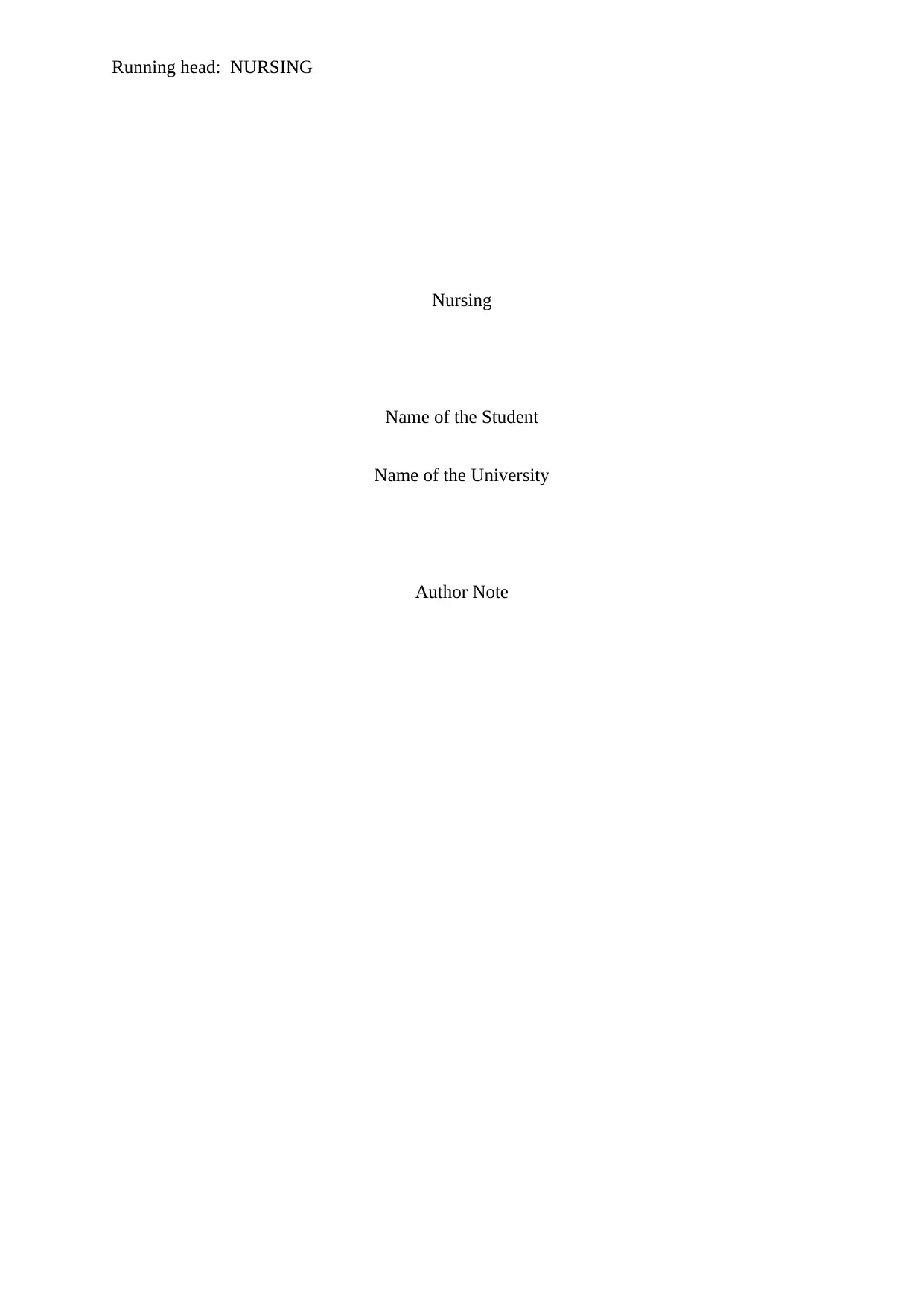
Running head: NURSING
Nursing
Name of the Student
Name of the University
Author Note
Nursing
Name of the Student
Name of the University
Author Note
Paraphrase This Document
Need a fresh take? Get an instant paraphrase of this document with our AI Paraphraser
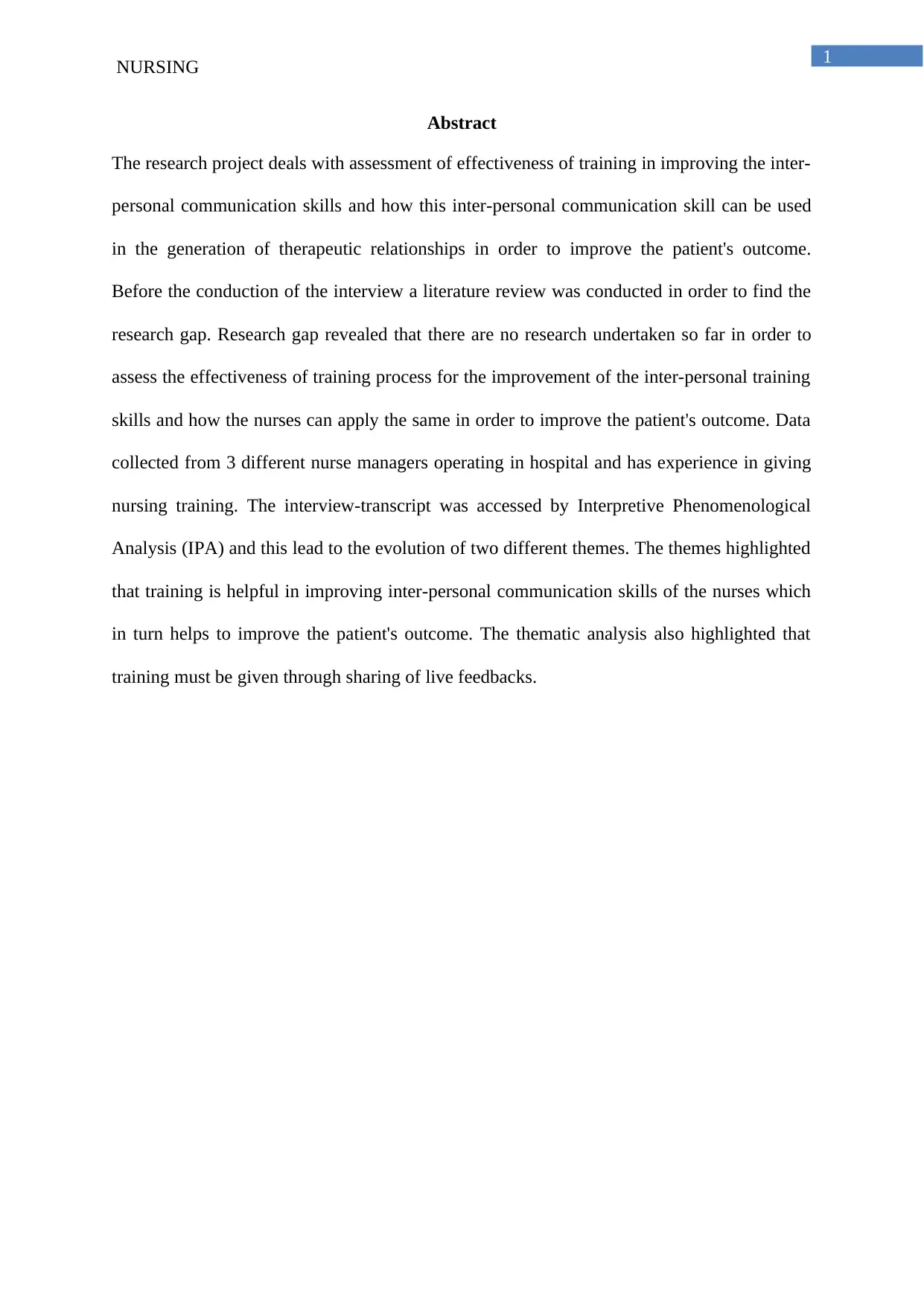
1
NURSING
Abstract
The research project deals with assessment of effectiveness of training in improving the inter-
personal communication skills and how this inter-personal communication skill can be used
in the generation of therapeutic relationships in order to improve the patient's outcome.
Before the conduction of the interview a literature review was conducted in order to find the
research gap. Research gap revealed that there are no research undertaken so far in order to
assess the effectiveness of training process for the improvement of the inter-personal training
skills and how the nurses can apply the same in order to improve the patient's outcome. Data
collected from 3 different nurse managers operating in hospital and has experience in giving
nursing training. The interview-transcript was accessed by Interpretive Phenomenological
Analysis (IPA) and this lead to the evolution of two different themes. The themes highlighted
that training is helpful in improving inter-personal communication skills of the nurses which
in turn helps to improve the patient's outcome. The thematic analysis also highlighted that
training must be given through sharing of live feedbacks.
NURSING
Abstract
The research project deals with assessment of effectiveness of training in improving the inter-
personal communication skills and how this inter-personal communication skill can be used
in the generation of therapeutic relationships in order to improve the patient's outcome.
Before the conduction of the interview a literature review was conducted in order to find the
research gap. Research gap revealed that there are no research undertaken so far in order to
assess the effectiveness of training process for the improvement of the inter-personal training
skills and how the nurses can apply the same in order to improve the patient's outcome. Data
collected from 3 different nurse managers operating in hospital and has experience in giving
nursing training. The interview-transcript was accessed by Interpretive Phenomenological
Analysis (IPA) and this lead to the evolution of two different themes. The themes highlighted
that training is helpful in improving inter-personal communication skills of the nurses which
in turn helps to improve the patient's outcome. The thematic analysis also highlighted that
training must be given through sharing of live feedbacks.
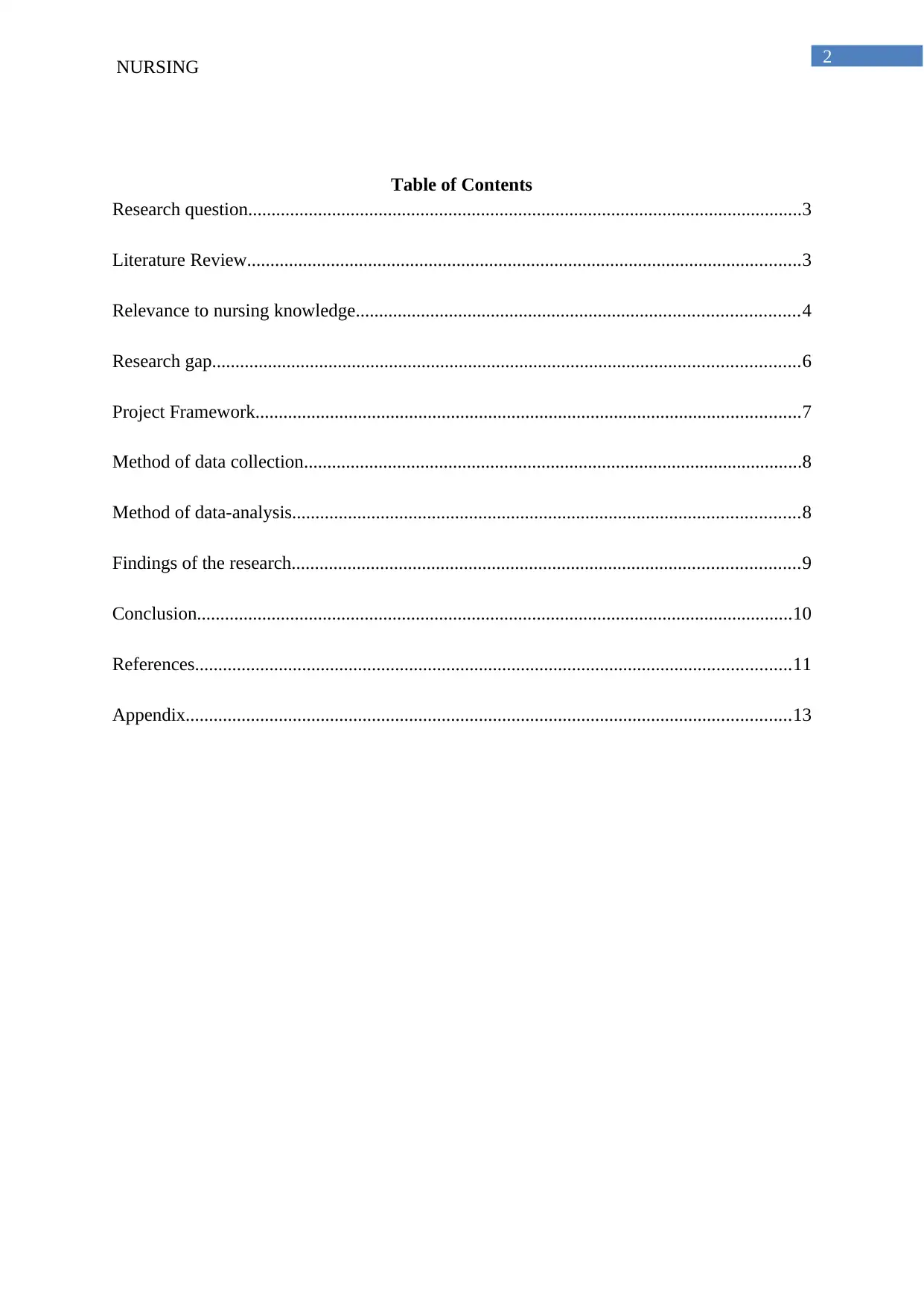
2
NURSING
Table of Contents
Research question.......................................................................................................................3
Literature Review.......................................................................................................................3
Relevance to nursing knowledge...............................................................................................4
Research gap..............................................................................................................................6
Project Framework.....................................................................................................................7
Method of data collection...........................................................................................................8
Method of data-analysis.............................................................................................................8
Findings of the research.............................................................................................................9
Conclusion................................................................................................................................10
References................................................................................................................................11
Appendix..................................................................................................................................13
NURSING
Table of Contents
Research question.......................................................................................................................3
Literature Review.......................................................................................................................3
Relevance to nursing knowledge...............................................................................................4
Research gap..............................................................................................................................6
Project Framework.....................................................................................................................7
Method of data collection...........................................................................................................8
Method of data-analysis.............................................................................................................8
Findings of the research.............................................................................................................9
Conclusion................................................................................................................................10
References................................................................................................................................11
Appendix..................................................................................................................................13
⊘ This is a preview!⊘
Do you want full access?
Subscribe today to unlock all pages.

Trusted by 1+ million students worldwide
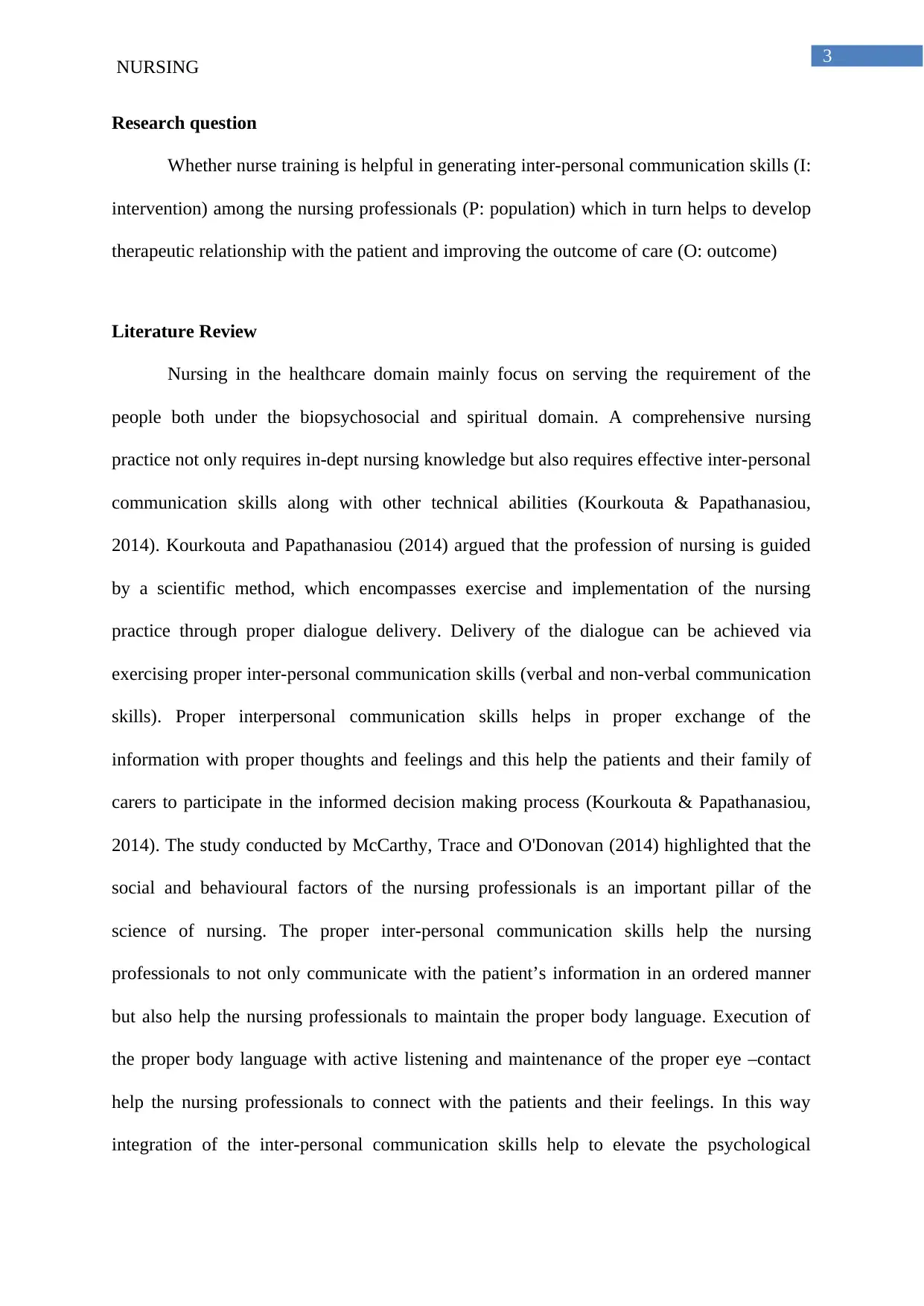
3
NURSING
Research question
Whether nurse training is helpful in generating inter-personal communication skills (I:
intervention) among the nursing professionals (P: population) which in turn helps to develop
therapeutic relationship with the patient and improving the outcome of care (O: outcome)
Literature Review
Nursing in the healthcare domain mainly focus on serving the requirement of the
people both under the biopsychosocial and spiritual domain. A comprehensive nursing
practice not only requires in-dept nursing knowledge but also requires effective inter-personal
communication skills along with other technical abilities (Kourkouta & Papathanasiou,
2014). Kourkouta and Papathanasiou (2014) argued that the profession of nursing is guided
by a scientific method, which encompasses exercise and implementation of the nursing
practice through proper dialogue delivery. Delivery of the dialogue can be achieved via
exercising proper inter-personal communication skills (verbal and non-verbal communication
skills). Proper interpersonal communication skills helps in proper exchange of the
information with proper thoughts and feelings and this help the patients and their family of
carers to participate in the informed decision making process (Kourkouta & Papathanasiou,
2014). The study conducted by McCarthy, Trace and O'Donovan (2014) highlighted that the
social and behavioural factors of the nursing professionals is an important pillar of the
science of nursing. The proper inter-personal communication skills help the nursing
professionals to not only communicate with the patient’s information in an ordered manner
but also help the nursing professionals to maintain the proper body language. Execution of
the proper body language with active listening and maintenance of the proper eye –contact
help the nursing professionals to connect with the patients and their feelings. In this way
integration of the inter-personal communication skills help to elevate the psychological
NURSING
Research question
Whether nurse training is helpful in generating inter-personal communication skills (I:
intervention) among the nursing professionals (P: population) which in turn helps to develop
therapeutic relationship with the patient and improving the outcome of care (O: outcome)
Literature Review
Nursing in the healthcare domain mainly focus on serving the requirement of the
people both under the biopsychosocial and spiritual domain. A comprehensive nursing
practice not only requires in-dept nursing knowledge but also requires effective inter-personal
communication skills along with other technical abilities (Kourkouta & Papathanasiou,
2014). Kourkouta and Papathanasiou (2014) argued that the profession of nursing is guided
by a scientific method, which encompasses exercise and implementation of the nursing
practice through proper dialogue delivery. Delivery of the dialogue can be achieved via
exercising proper inter-personal communication skills (verbal and non-verbal communication
skills). Proper interpersonal communication skills helps in proper exchange of the
information with proper thoughts and feelings and this help the patients and their family of
carers to participate in the informed decision making process (Kourkouta & Papathanasiou,
2014). The study conducted by McCarthy, Trace and O'Donovan (2014) highlighted that the
social and behavioural factors of the nursing professionals is an important pillar of the
science of nursing. The proper inter-personal communication skills help the nursing
professionals to not only communicate with the patient’s information in an ordered manner
but also help the nursing professionals to maintain the proper body language. Execution of
the proper body language with active listening and maintenance of the proper eye –contact
help the nursing professionals to connect with the patients and their feelings. In this way
integration of the inter-personal communication skills help to elevate the psychological
Paraphrase This Document
Need a fresh take? Get an instant paraphrase of this document with our AI Paraphraser
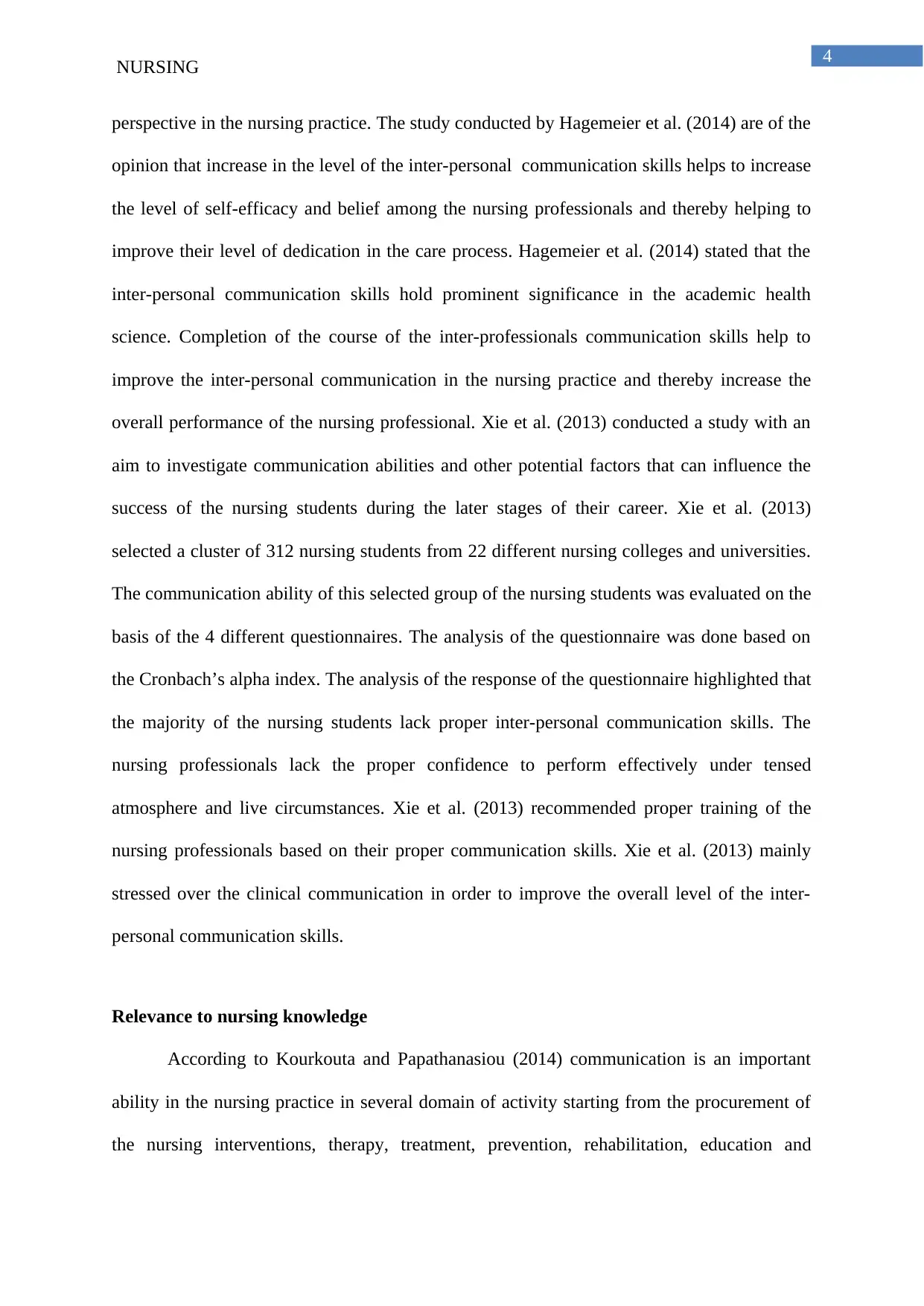
4
NURSING
perspective in the nursing practice. The study conducted by Hagemeier et al. (2014) are of the
opinion that increase in the level of the inter-personal communication skills helps to increase
the level of self-efficacy and belief among the nursing professionals and thereby helping to
improve their level of dedication in the care process. Hagemeier et al. (2014) stated that the
inter-personal communication skills hold prominent significance in the academic health
science. Completion of the course of the inter-professionals communication skills help to
improve the inter-personal communication in the nursing practice and thereby increase the
overall performance of the nursing professional. Xie et al. (2013) conducted a study with an
aim to investigate communication abilities and other potential factors that can influence the
success of the nursing students during the later stages of their career. Xie et al. (2013)
selected a cluster of 312 nursing students from 22 different nursing colleges and universities.
The communication ability of this selected group of the nursing students was evaluated on the
basis of the 4 different questionnaires. The analysis of the questionnaire was done based on
the Cronbach’s alpha index. The analysis of the response of the questionnaire highlighted that
the majority of the nursing students lack proper inter-personal communication skills. The
nursing professionals lack the proper confidence to perform effectively under tensed
atmosphere and live circumstances. Xie et al. (2013) recommended proper training of the
nursing professionals based on their proper communication skills. Xie et al. (2013) mainly
stressed over the clinical communication in order to improve the overall level of the inter-
personal communication skills.
Relevance to nursing knowledge
According to Kourkouta and Papathanasiou (2014) communication is an important
ability in the nursing practice in several domain of activity starting from the procurement of
the nursing interventions, therapy, treatment, prevention, rehabilitation, education and
NURSING
perspective in the nursing practice. The study conducted by Hagemeier et al. (2014) are of the
opinion that increase in the level of the inter-personal communication skills helps to increase
the level of self-efficacy and belief among the nursing professionals and thereby helping to
improve their level of dedication in the care process. Hagemeier et al. (2014) stated that the
inter-personal communication skills hold prominent significance in the academic health
science. Completion of the course of the inter-professionals communication skills help to
improve the inter-personal communication in the nursing practice and thereby increase the
overall performance of the nursing professional. Xie et al. (2013) conducted a study with an
aim to investigate communication abilities and other potential factors that can influence the
success of the nursing students during the later stages of their career. Xie et al. (2013)
selected a cluster of 312 nursing students from 22 different nursing colleges and universities.
The communication ability of this selected group of the nursing students was evaluated on the
basis of the 4 different questionnaires. The analysis of the questionnaire was done based on
the Cronbach’s alpha index. The analysis of the response of the questionnaire highlighted that
the majority of the nursing students lack proper inter-personal communication skills. The
nursing professionals lack the proper confidence to perform effectively under tensed
atmosphere and live circumstances. Xie et al. (2013) recommended proper training of the
nursing professionals based on their proper communication skills. Xie et al. (2013) mainly
stressed over the clinical communication in order to improve the overall level of the inter-
personal communication skills.
Relevance to nursing knowledge
According to Kourkouta and Papathanasiou (2014) communication is an important
ability in the nursing practice in several domain of activity starting from the procurement of
the nursing interventions, therapy, treatment, prevention, rehabilitation, education and
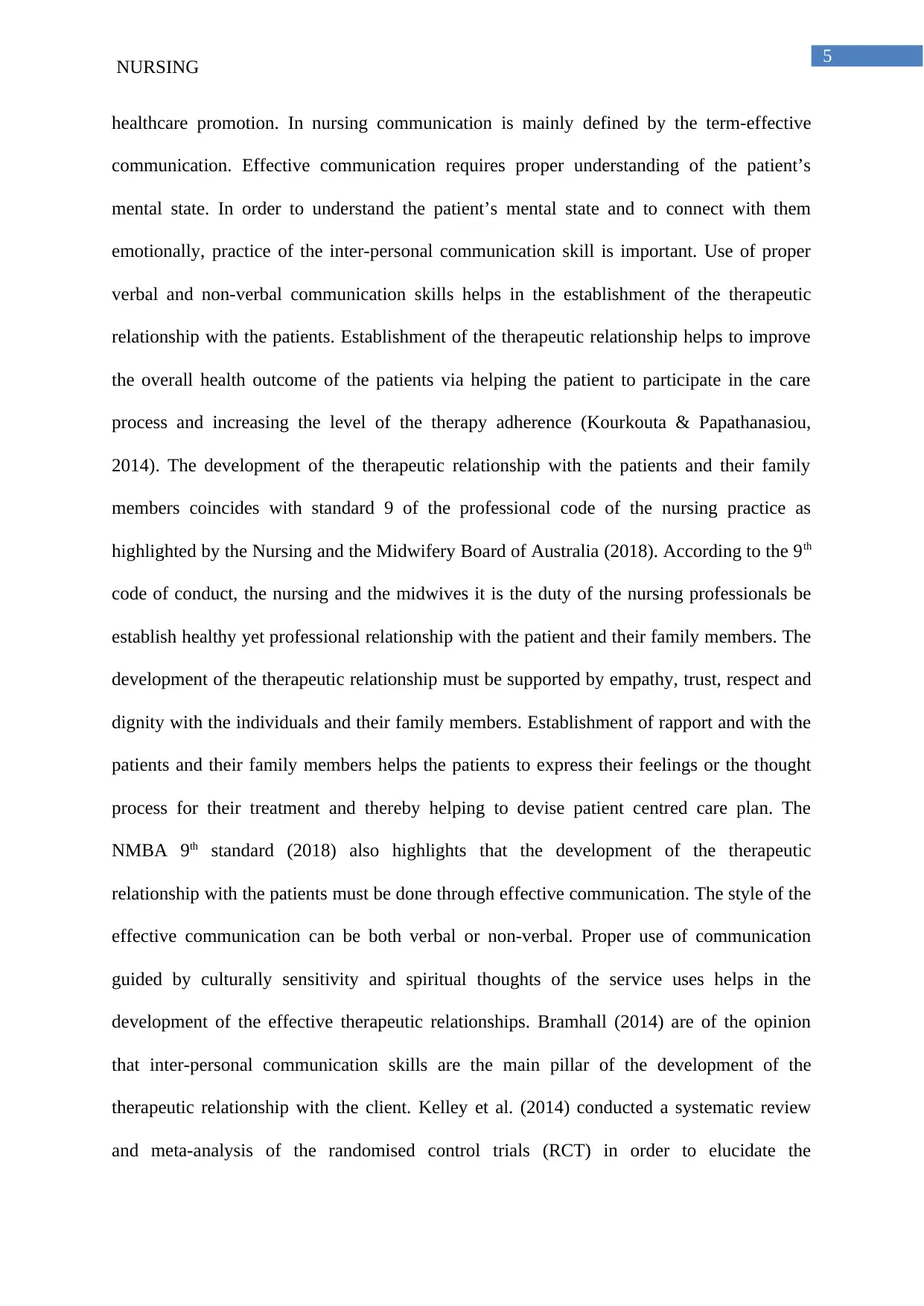
5
NURSING
healthcare promotion. In nursing communication is mainly defined by the term-effective
communication. Effective communication requires proper understanding of the patient’s
mental state. In order to understand the patient’s mental state and to connect with them
emotionally, practice of the inter-personal communication skill is important. Use of proper
verbal and non-verbal communication skills helps in the establishment of the therapeutic
relationship with the patients. Establishment of the therapeutic relationship helps to improve
the overall health outcome of the patients via helping the patient to participate in the care
process and increasing the level of the therapy adherence (Kourkouta & Papathanasiou,
2014). The development of the therapeutic relationship with the patients and their family
members coincides with standard 9 of the professional code of the nursing practice as
highlighted by the Nursing and the Midwifery Board of Australia (2018). According to the 9th
code of conduct, the nursing and the midwives it is the duty of the nursing professionals be
establish healthy yet professional relationship with the patient and their family members. The
development of the therapeutic relationship must be supported by empathy, trust, respect and
dignity with the individuals and their family members. Establishment of rapport and with the
patients and their family members helps the patients to express their feelings or the thought
process for their treatment and thereby helping to devise patient centred care plan. The
NMBA 9th standard (2018) also highlights that the development of the therapeutic
relationship with the patients must be done through effective communication. The style of the
effective communication can be both verbal or non-verbal. Proper use of communication
guided by culturally sensitivity and spiritual thoughts of the service uses helps in the
development of the effective therapeutic relationships. Bramhall (2014) are of the opinion
that inter-personal communication skills are the main pillar of the development of the
therapeutic relationship with the client. Kelley et al. (2014) conducted a systematic review
and meta-analysis of the randomised control trials (RCT) in order to elucidate the
NURSING
healthcare promotion. In nursing communication is mainly defined by the term-effective
communication. Effective communication requires proper understanding of the patient’s
mental state. In order to understand the patient’s mental state and to connect with them
emotionally, practice of the inter-personal communication skill is important. Use of proper
verbal and non-verbal communication skills helps in the establishment of the therapeutic
relationship with the patients. Establishment of the therapeutic relationship helps to improve
the overall health outcome of the patients via helping the patient to participate in the care
process and increasing the level of the therapy adherence (Kourkouta & Papathanasiou,
2014). The development of the therapeutic relationship with the patients and their family
members coincides with standard 9 of the professional code of the nursing practice as
highlighted by the Nursing and the Midwifery Board of Australia (2018). According to the 9th
code of conduct, the nursing and the midwives it is the duty of the nursing professionals be
establish healthy yet professional relationship with the patient and their family members. The
development of the therapeutic relationship must be supported by empathy, trust, respect and
dignity with the individuals and their family members. Establishment of rapport and with the
patients and their family members helps the patients to express their feelings or the thought
process for their treatment and thereby helping to devise patient centred care plan. The
NMBA 9th standard (2018) also highlights that the development of the therapeutic
relationship with the patients must be done through effective communication. The style of the
effective communication can be both verbal or non-verbal. Proper use of communication
guided by culturally sensitivity and spiritual thoughts of the service uses helps in the
development of the effective therapeutic relationships. Bramhall (2014) are of the opinion
that inter-personal communication skills are the main pillar of the development of the
therapeutic relationship with the client. Kelley et al. (2014) conducted a systematic review
and meta-analysis of the randomised control trials (RCT) in order to elucidate the
⊘ This is a preview!⊘
Do you want full access?
Subscribe today to unlock all pages.

Trusted by 1+ million students worldwide
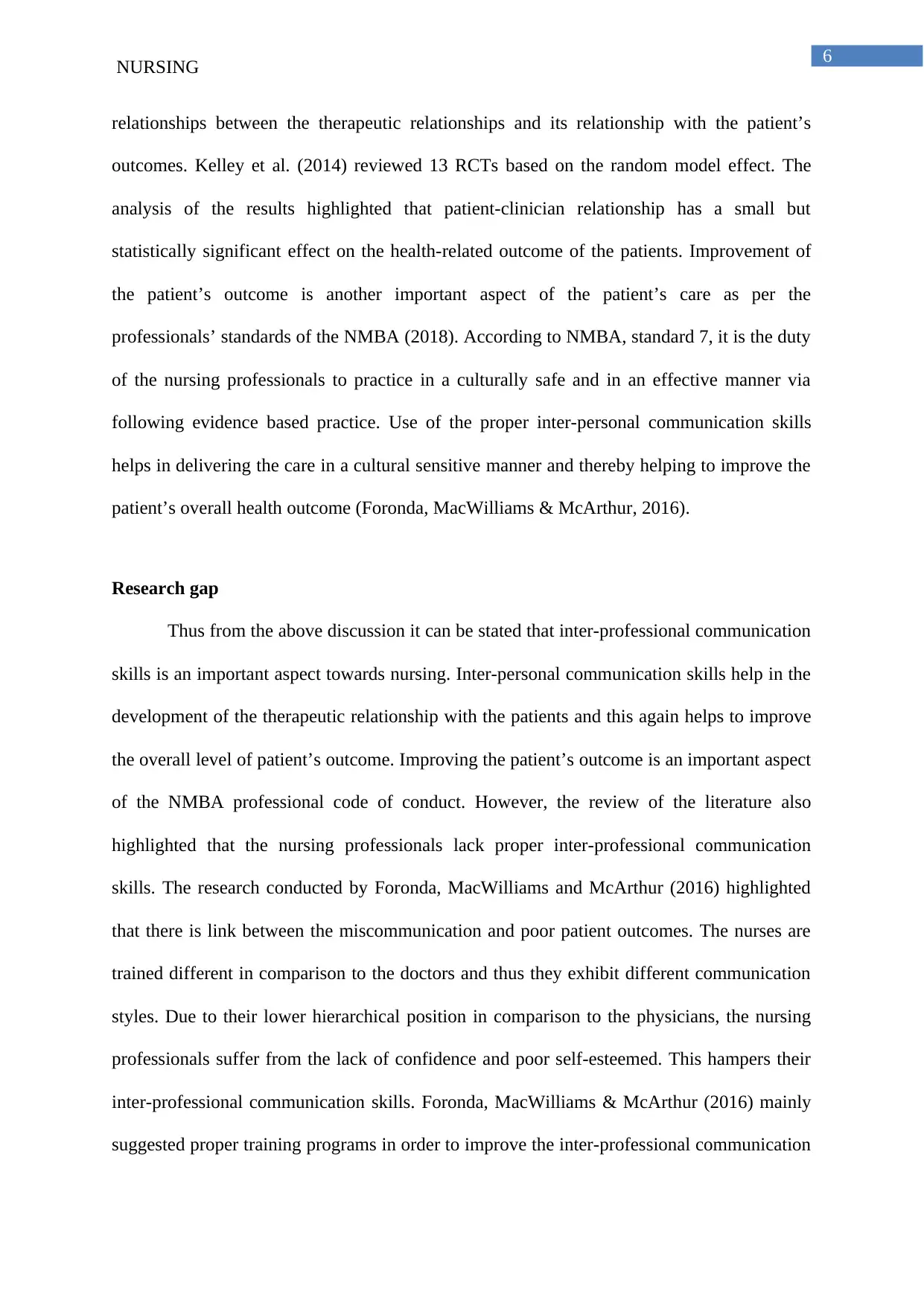
6
NURSING
relationships between the therapeutic relationships and its relationship with the patient’s
outcomes. Kelley et al. (2014) reviewed 13 RCTs based on the random model effect. The
analysis of the results highlighted that patient-clinician relationship has a small but
statistically significant effect on the health-related outcome of the patients. Improvement of
the patient’s outcome is another important aspect of the patient’s care as per the
professionals’ standards of the NMBA (2018). According to NMBA, standard 7, it is the duty
of the nursing professionals to practice in a culturally safe and in an effective manner via
following evidence based practice. Use of the proper inter-personal communication skills
helps in delivering the care in a cultural sensitive manner and thereby helping to improve the
patient’s overall health outcome (Foronda, MacWilliams & McArthur, 2016).
Research gap
Thus from the above discussion it can be stated that inter-professional communication
skills is an important aspect towards nursing. Inter-personal communication skills help in the
development of the therapeutic relationship with the patients and this again helps to improve
the overall level of patient’s outcome. Improving the patient’s outcome is an important aspect
of the NMBA professional code of conduct. However, the review of the literature also
highlighted that the nursing professionals lack proper inter-professional communication
skills. The research conducted by Foronda, MacWilliams and McArthur (2016) highlighted
that there is link between the miscommunication and poor patient outcomes. The nurses are
trained different in comparison to the doctors and thus they exhibit different communication
styles. Due to their lower hierarchical position in comparison to the physicians, the nursing
professionals suffer from the lack of confidence and poor self-esteemed. This hampers their
inter-professional communication skills. Foronda, MacWilliams & McArthur (2016) mainly
suggested proper training programs in order to improve the inter-professional communication
NURSING
relationships between the therapeutic relationships and its relationship with the patient’s
outcomes. Kelley et al. (2014) reviewed 13 RCTs based on the random model effect. The
analysis of the results highlighted that patient-clinician relationship has a small but
statistically significant effect on the health-related outcome of the patients. Improvement of
the patient’s outcome is another important aspect of the patient’s care as per the
professionals’ standards of the NMBA (2018). According to NMBA, standard 7, it is the duty
of the nursing professionals to practice in a culturally safe and in an effective manner via
following evidence based practice. Use of the proper inter-personal communication skills
helps in delivering the care in a cultural sensitive manner and thereby helping to improve the
patient’s overall health outcome (Foronda, MacWilliams & McArthur, 2016).
Research gap
Thus from the above discussion it can be stated that inter-professional communication
skills is an important aspect towards nursing. Inter-personal communication skills help in the
development of the therapeutic relationship with the patients and this again helps to improve
the overall level of patient’s outcome. Improving the patient’s outcome is an important aspect
of the NMBA professional code of conduct. However, the review of the literature also
highlighted that the nursing professionals lack proper inter-professional communication
skills. The research conducted by Foronda, MacWilliams and McArthur (2016) highlighted
that there is link between the miscommunication and poor patient outcomes. The nurses are
trained different in comparison to the doctors and thus they exhibit different communication
styles. Due to their lower hierarchical position in comparison to the physicians, the nursing
professionals suffer from the lack of confidence and poor self-esteemed. This hampers their
inter-professional communication skills. Foronda, MacWilliams & McArthur (2016) mainly
suggested proper training programs in order to improve the inter-professional communication
Paraphrase This Document
Need a fresh take? Get an instant paraphrase of this document with our AI Paraphraser
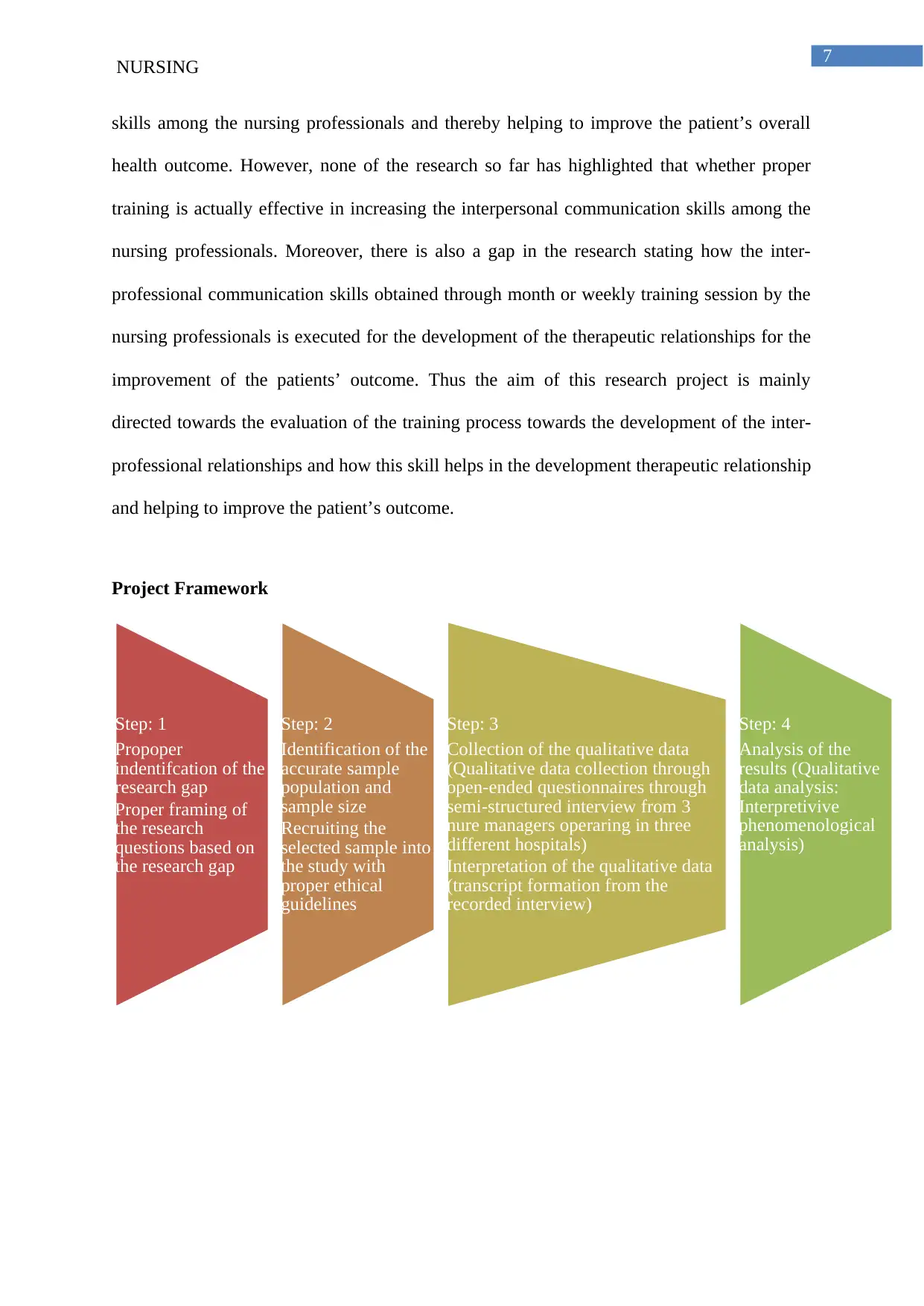
7
NURSING
skills among the nursing professionals and thereby helping to improve the patient’s overall
health outcome. However, none of the research so far has highlighted that whether proper
training is actually effective in increasing the interpersonal communication skills among the
nursing professionals. Moreover, there is also a gap in the research stating how the inter-
professional communication skills obtained through month or weekly training session by the
nursing professionals is executed for the development of the therapeutic relationships for the
improvement of the patients’ outcome. Thus the aim of this research project is mainly
directed towards the evaluation of the training process towards the development of the inter-
professional relationships and how this skill helps in the development therapeutic relationship
and helping to improve the patient’s outcome.
Project Framework
Step: 1
Propoper
indentifcation of the
research gap
Proper framing of
the research
questions based on
the research gap
Step: 2
Identification of the
accurate sample
population and
sample size
Recruiting the
selected sample into
the study with
proper ethical
guidelines
Step: 3
Collection of the qualitative data
(Qualitative data collection through
open-ended questionnaires through
semi-structured interview from 3
nure managers operaring in three
different hospitals)
Interpretation of the qualitative data
(transcript formation from the
recorded interview)
Step: 4
Analysis of the
results (Qualitative
data analysis:
Interpretivive
phenomenological
analysis)
NURSING
skills among the nursing professionals and thereby helping to improve the patient’s overall
health outcome. However, none of the research so far has highlighted that whether proper
training is actually effective in increasing the interpersonal communication skills among the
nursing professionals. Moreover, there is also a gap in the research stating how the inter-
professional communication skills obtained through month or weekly training session by the
nursing professionals is executed for the development of the therapeutic relationships for the
improvement of the patients’ outcome. Thus the aim of this research project is mainly
directed towards the evaluation of the training process towards the development of the inter-
professional relationships and how this skill helps in the development therapeutic relationship
and helping to improve the patient’s outcome.
Project Framework
Step: 1
Propoper
indentifcation of the
research gap
Proper framing of
the research
questions based on
the research gap
Step: 2
Identification of the
accurate sample
population and
sample size
Recruiting the
selected sample into
the study with
proper ethical
guidelines
Step: 3
Collection of the qualitative data
(Qualitative data collection through
open-ended questionnaires through
semi-structured interview from 3
nure managers operaring in three
different hospitals)
Interpretation of the qualitative data
(transcript formation from the
recorded interview)
Step: 4
Analysis of the
results (Qualitative
data analysis:
Interpretivive
phenomenological
analysis)
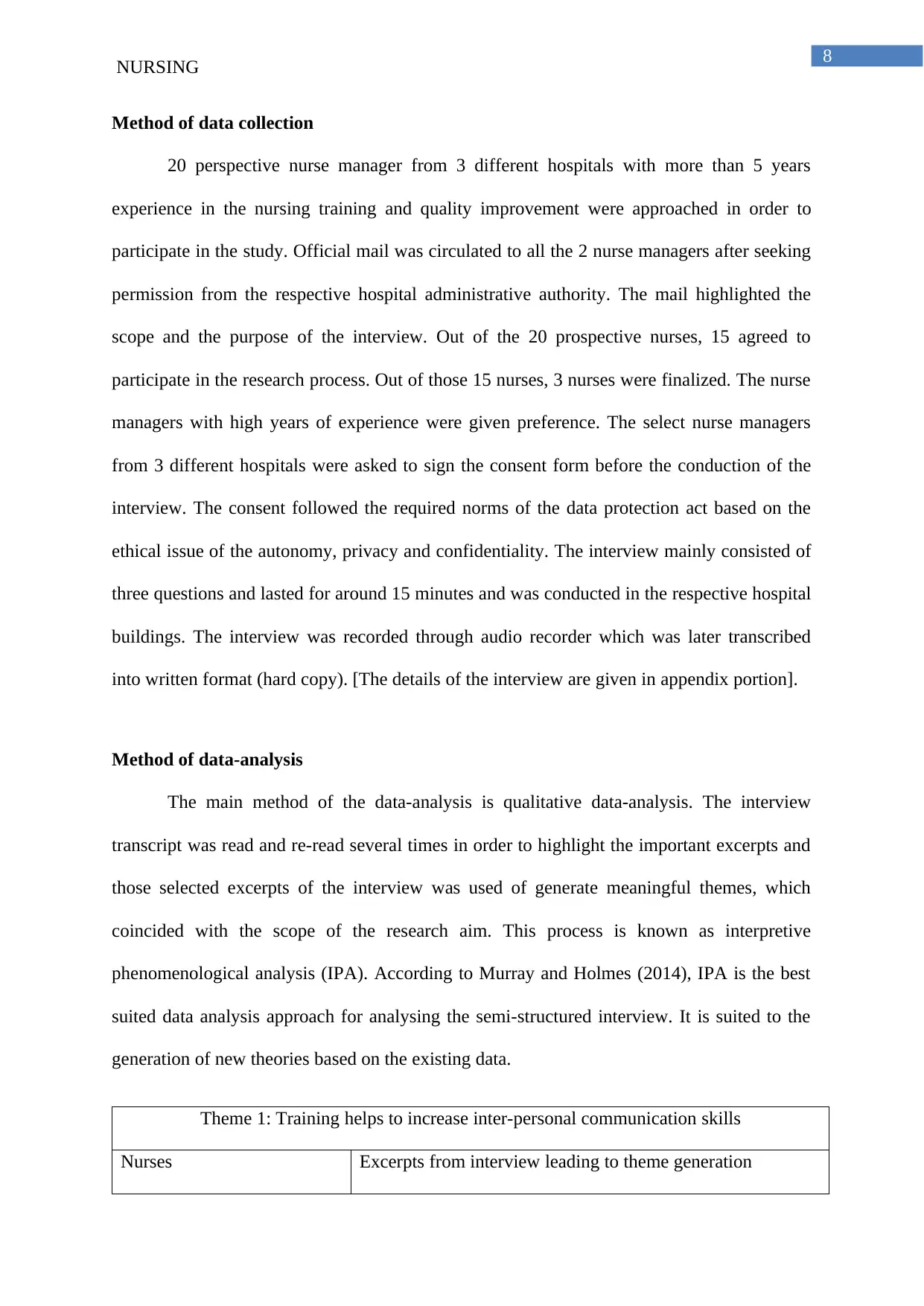
8
NURSING
Method of data collection
20 perspective nurse manager from 3 different hospitals with more than 5 years
experience in the nursing training and quality improvement were approached in order to
participate in the study. Official mail was circulated to all the 2 nurse managers after seeking
permission from the respective hospital administrative authority. The mail highlighted the
scope and the purpose of the interview. Out of the 20 prospective nurses, 15 agreed to
participate in the research process. Out of those 15 nurses, 3 nurses were finalized. The nurse
managers with high years of experience were given preference. The select nurse managers
from 3 different hospitals were asked to sign the consent form before the conduction of the
interview. The consent followed the required norms of the data protection act based on the
ethical issue of the autonomy, privacy and confidentiality. The interview mainly consisted of
three questions and lasted for around 15 minutes and was conducted in the respective hospital
buildings. The interview was recorded through audio recorder which was later transcribed
into written format (hard copy). [The details of the interview are given in appendix portion].
Method of data-analysis
The main method of the data-analysis is qualitative data-analysis. The interview
transcript was read and re-read several times in order to highlight the important excerpts and
those selected excerpts of the interview was used of generate meaningful themes, which
coincided with the scope of the research aim. This process is known as interpretive
phenomenological analysis (IPA). According to Murray and Holmes (2014), IPA is the best
suited data analysis approach for analysing the semi-structured interview. It is suited to the
generation of new theories based on the existing data.
Theme 1: Training helps to increase inter-personal communication skills
Nurses Excerpts from interview leading to theme generation
NURSING
Method of data collection
20 perspective nurse manager from 3 different hospitals with more than 5 years
experience in the nursing training and quality improvement were approached in order to
participate in the study. Official mail was circulated to all the 2 nurse managers after seeking
permission from the respective hospital administrative authority. The mail highlighted the
scope and the purpose of the interview. Out of the 20 prospective nurses, 15 agreed to
participate in the research process. Out of those 15 nurses, 3 nurses were finalized. The nurse
managers with high years of experience were given preference. The select nurse managers
from 3 different hospitals were asked to sign the consent form before the conduction of the
interview. The consent followed the required norms of the data protection act based on the
ethical issue of the autonomy, privacy and confidentiality. The interview mainly consisted of
three questions and lasted for around 15 minutes and was conducted in the respective hospital
buildings. The interview was recorded through audio recorder which was later transcribed
into written format (hard copy). [The details of the interview are given in appendix portion].
Method of data-analysis
The main method of the data-analysis is qualitative data-analysis. The interview
transcript was read and re-read several times in order to highlight the important excerpts and
those selected excerpts of the interview was used of generate meaningful themes, which
coincided with the scope of the research aim. This process is known as interpretive
phenomenological analysis (IPA). According to Murray and Holmes (2014), IPA is the best
suited data analysis approach for analysing the semi-structured interview. It is suited to the
generation of new theories based on the existing data.
Theme 1: Training helps to increase inter-personal communication skills
Nurses Excerpts from interview leading to theme generation
⊘ This is a preview!⊘
Do you want full access?
Subscribe today to unlock all pages.

Trusted by 1+ million students worldwide
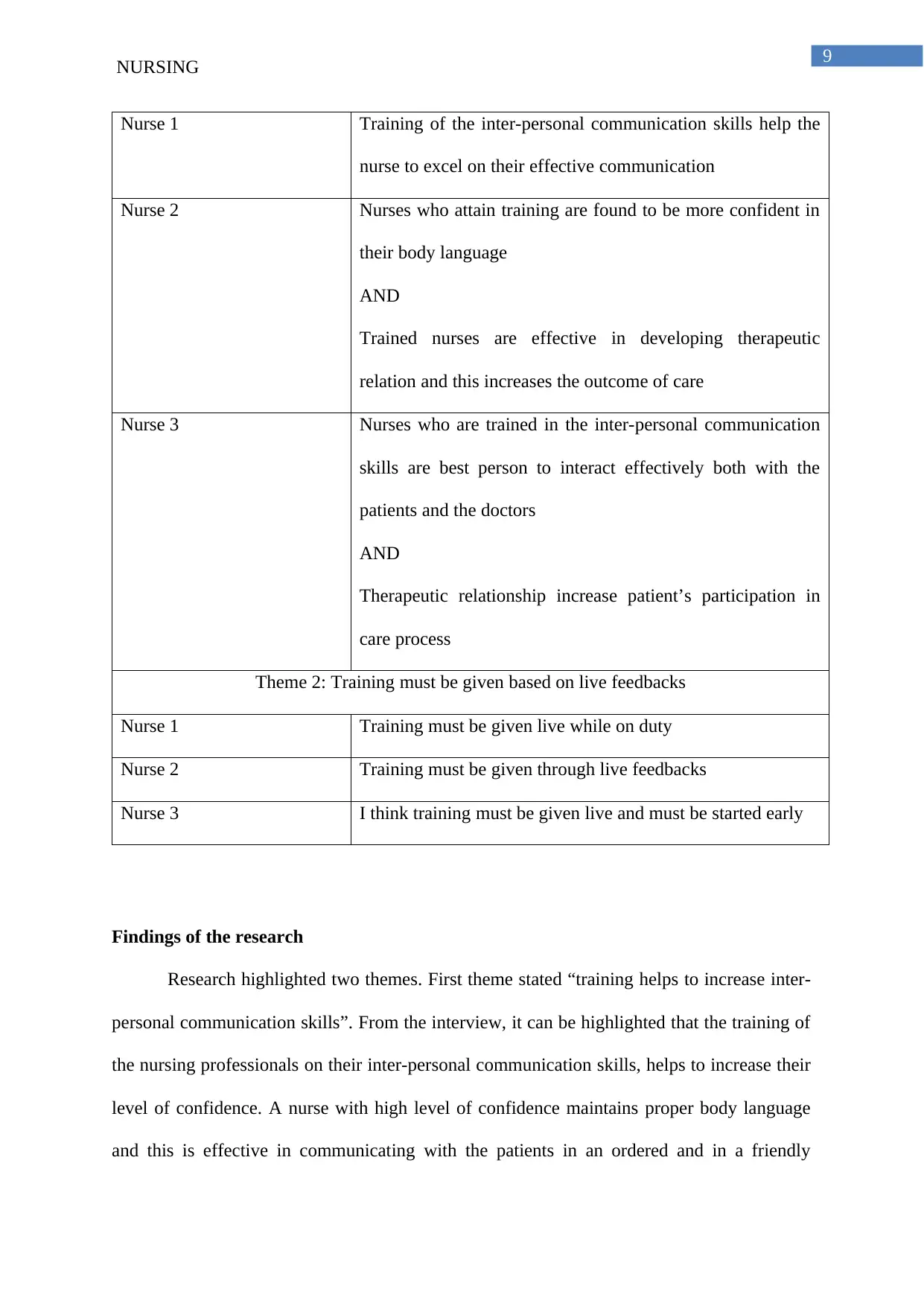
9
NURSING
Nurse 1 Training of the inter-personal communication skills help the
nurse to excel on their effective communication
Nurse 2 Nurses who attain training are found to be more confident in
their body language
AND
Trained nurses are effective in developing therapeutic
relation and this increases the outcome of care
Nurse 3 Nurses who are trained in the inter-personal communication
skills are best person to interact effectively both with the
patients and the doctors
AND
Therapeutic relationship increase patient’s participation in
care process
Theme 2: Training must be given based on live feedbacks
Nurse 1 Training must be given live while on duty
Nurse 2 Training must be given through live feedbacks
Nurse 3 I think training must be given live and must be started early
Findings of the research
Research highlighted two themes. First theme stated “training helps to increase inter-
personal communication skills”. From the interview, it can be highlighted that the training of
the nursing professionals on their inter-personal communication skills, helps to increase their
level of confidence. A nurse with high level of confidence maintains proper body language
and this is effective in communicating with the patients in an ordered and in a friendly
NURSING
Nurse 1 Training of the inter-personal communication skills help the
nurse to excel on their effective communication
Nurse 2 Nurses who attain training are found to be more confident in
their body language
AND
Trained nurses are effective in developing therapeutic
relation and this increases the outcome of care
Nurse 3 Nurses who are trained in the inter-personal communication
skills are best person to interact effectively both with the
patients and the doctors
AND
Therapeutic relationship increase patient’s participation in
care process
Theme 2: Training must be given based on live feedbacks
Nurse 1 Training must be given live while on duty
Nurse 2 Training must be given through live feedbacks
Nurse 3 I think training must be given live and must be started early
Findings of the research
Research highlighted two themes. First theme stated “training helps to increase inter-
personal communication skills”. From the interview, it can be highlighted that the training of
the nursing professionals on their inter-personal communication skills, helps to increase their
level of confidence. A nurse with high level of confidence maintains proper body language
and this is effective in communicating with the patients in an ordered and in a friendly
Paraphrase This Document
Need a fresh take? Get an instant paraphrase of this document with our AI Paraphraser
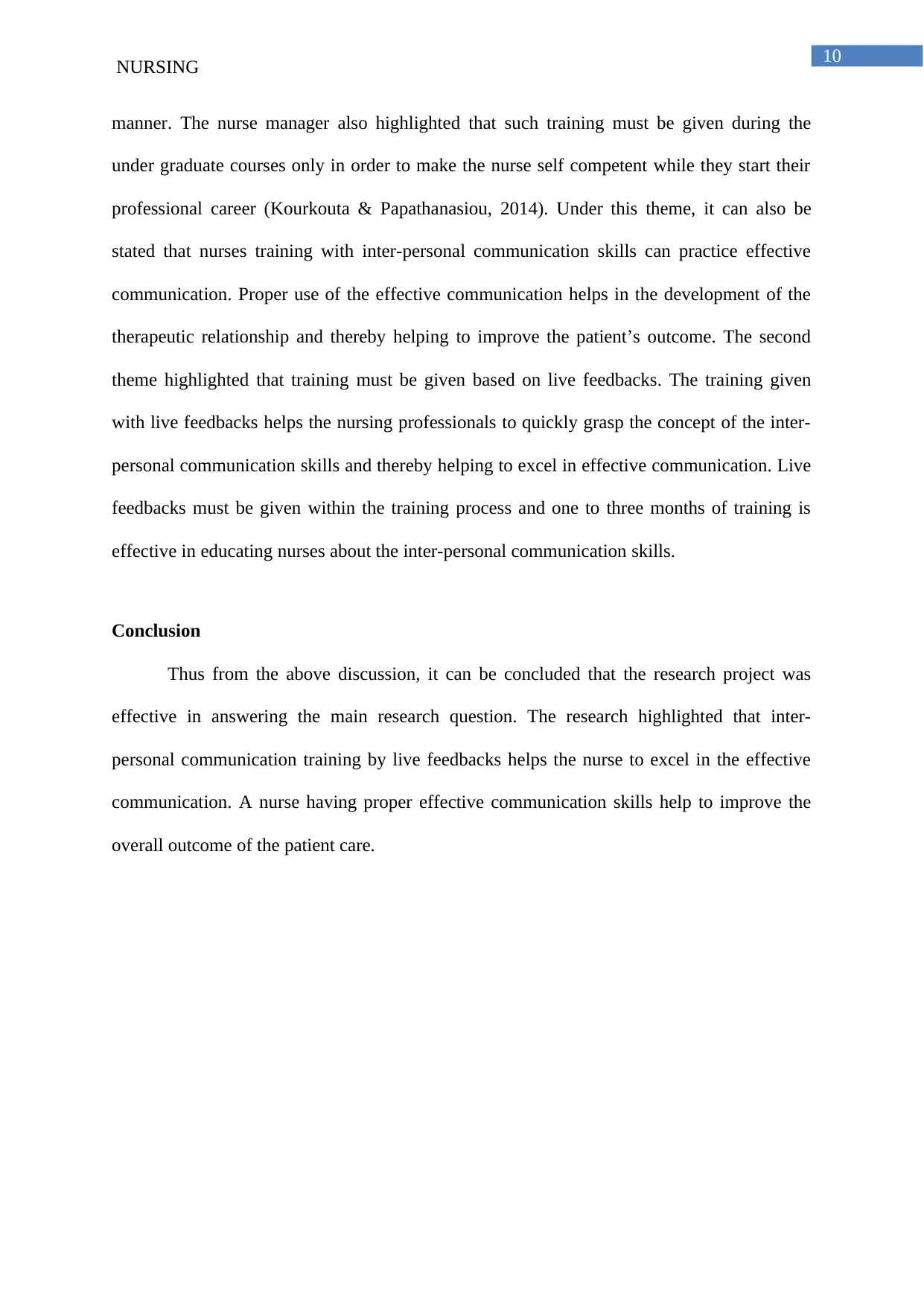
10
NURSING
manner. The nurse manager also highlighted that such training must be given during the
under graduate courses only in order to make the nurse self competent while they start their
professional career (Kourkouta & Papathanasiou, 2014). Under this theme, it can also be
stated that nurses training with inter-personal communication skills can practice effective
communication. Proper use of the effective communication helps in the development of the
therapeutic relationship and thereby helping to improve the patient’s outcome. The second
theme highlighted that training must be given based on live feedbacks. The training given
with live feedbacks helps the nursing professionals to quickly grasp the concept of the inter-
personal communication skills and thereby helping to excel in effective communication. Live
feedbacks must be given within the training process and one to three months of training is
effective in educating nurses about the inter-personal communication skills.
Conclusion
Thus from the above discussion, it can be concluded that the research project was
effective in answering the main research question. The research highlighted that inter-
personal communication training by live feedbacks helps the nurse to excel in the effective
communication. A nurse having proper effective communication skills help to improve the
overall outcome of the patient care.
NURSING
manner. The nurse manager also highlighted that such training must be given during the
under graduate courses only in order to make the nurse self competent while they start their
professional career (Kourkouta & Papathanasiou, 2014). Under this theme, it can also be
stated that nurses training with inter-personal communication skills can practice effective
communication. Proper use of the effective communication helps in the development of the
therapeutic relationship and thereby helping to improve the patient’s outcome. The second
theme highlighted that training must be given based on live feedbacks. The training given
with live feedbacks helps the nursing professionals to quickly grasp the concept of the inter-
personal communication skills and thereby helping to excel in effective communication. Live
feedbacks must be given within the training process and one to three months of training is
effective in educating nurses about the inter-personal communication skills.
Conclusion
Thus from the above discussion, it can be concluded that the research project was
effective in answering the main research question. The research highlighted that inter-
personal communication training by live feedbacks helps the nurse to excel in the effective
communication. A nurse having proper effective communication skills help to improve the
overall outcome of the patient care.
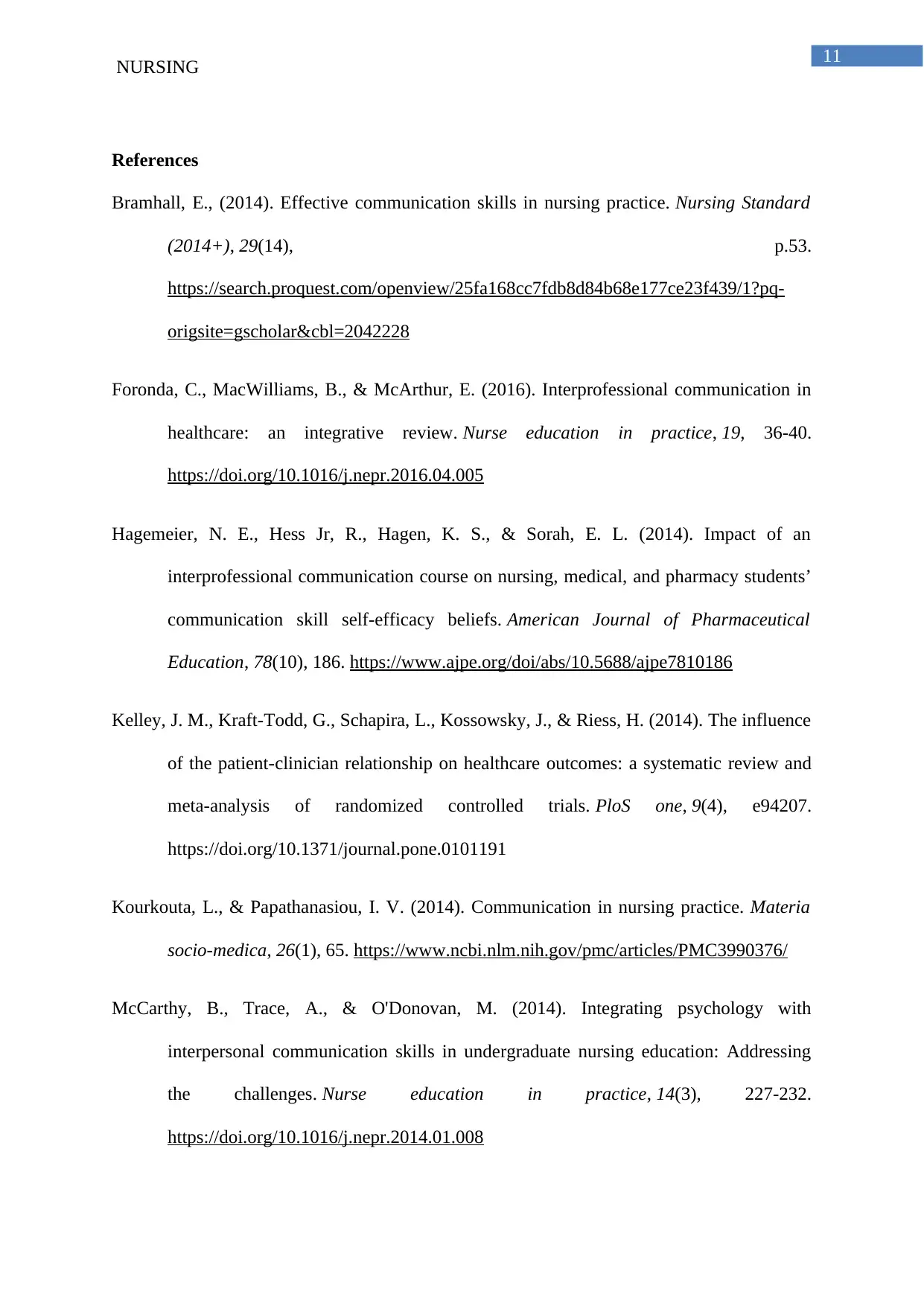
11
NURSING
References
Bramhall, E., (2014). Effective communication skills in nursing practice. Nursing Standard
(2014+), 29(14), p.53.
https://search.proquest.com/openview/25fa168cc7fdb8d84b68e177ce23f439/1?pq-
origsite=gscholar&cbl=2042228
Foronda, C., MacWilliams, B., & McArthur, E. (2016). Interprofessional communication in
healthcare: an integrative review. Nurse education in practice, 19, 36-40.
https://doi.org/10.1016/j.nepr.2016.04.005
Hagemeier, N. E., Hess Jr, R., Hagen, K. S., & Sorah, E. L. (2014). Impact of an
interprofessional communication course on nursing, medical, and pharmacy students’
communication skill self-efficacy beliefs. American Journal of Pharmaceutical
Education, 78(10), 186. https://www.ajpe.org/doi/abs/10.5688/ajpe7810186
Kelley, J. M., Kraft-Todd, G., Schapira, L., Kossowsky, J., & Riess, H. (2014). The influence
of the patient-clinician relationship on healthcare outcomes: a systematic review and
meta-analysis of randomized controlled trials. PloS one, 9(4), e94207.
https://doi.org/10.1371/journal.pone.0101191
Kourkouta, L., & Papathanasiou, I. V. (2014). Communication in nursing practice. Materia
socio-medica, 26(1), 65. https://www.ncbi.nlm.nih.gov/pmc/articles/PMC3990376/
McCarthy, B., Trace, A., & O'Donovan, M. (2014). Integrating psychology with
interpersonal communication skills in undergraduate nursing education: Addressing
the challenges. Nurse education in practice, 14(3), 227-232.
https://doi.org/10.1016/j.nepr.2014.01.008
NURSING
References
Bramhall, E., (2014). Effective communication skills in nursing practice. Nursing Standard
(2014+), 29(14), p.53.
https://search.proquest.com/openview/25fa168cc7fdb8d84b68e177ce23f439/1?pq-
origsite=gscholar&cbl=2042228
Foronda, C., MacWilliams, B., & McArthur, E. (2016). Interprofessional communication in
healthcare: an integrative review. Nurse education in practice, 19, 36-40.
https://doi.org/10.1016/j.nepr.2016.04.005
Hagemeier, N. E., Hess Jr, R., Hagen, K. S., & Sorah, E. L. (2014). Impact of an
interprofessional communication course on nursing, medical, and pharmacy students’
communication skill self-efficacy beliefs. American Journal of Pharmaceutical
Education, 78(10), 186. https://www.ajpe.org/doi/abs/10.5688/ajpe7810186
Kelley, J. M., Kraft-Todd, G., Schapira, L., Kossowsky, J., & Riess, H. (2014). The influence
of the patient-clinician relationship on healthcare outcomes: a systematic review and
meta-analysis of randomized controlled trials. PloS one, 9(4), e94207.
https://doi.org/10.1371/journal.pone.0101191
Kourkouta, L., & Papathanasiou, I. V. (2014). Communication in nursing practice. Materia
socio-medica, 26(1), 65. https://www.ncbi.nlm.nih.gov/pmc/articles/PMC3990376/
McCarthy, B., Trace, A., & O'Donovan, M. (2014). Integrating psychology with
interpersonal communication skills in undergraduate nursing education: Addressing
the challenges. Nurse education in practice, 14(3), 227-232.
https://doi.org/10.1016/j.nepr.2014.01.008
⊘ This is a preview!⊘
Do you want full access?
Subscribe today to unlock all pages.

Trusted by 1+ million students worldwide
1 out of 15
Related Documents
Your All-in-One AI-Powered Toolkit for Academic Success.
+13062052269
info@desklib.com
Available 24*7 on WhatsApp / Email
![[object Object]](/_next/static/media/star-bottom.7253800d.svg)
Unlock your academic potential
Copyright © 2020–2026 A2Z Services. All Rights Reserved. Developed and managed by ZUCOL.





